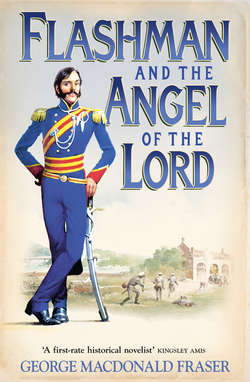Читать книгу Flashman and the Angel of the Lord - George Fraser MacDonald - Страница 8
EXPLANATORY NOTE
ОглавлениеOf all the roles played by Sir Harry Flashman, V.C., in the course of his distinguished and deplorable career, that of crusader must seem the least likely. The nine volumes of his Papers which have been presented to the public since their discovery in a Midlands saleroom in 1966 make a scandalous catalogue in which there is little trace of decent feeling, let alone altruism. From the day of his expulsion from Rugby School in the late 1830s (memorably described in Tom Brown’s Schooldays), Flashman the man fulfilled the disgraceful promise of Flashman the boy; the toadying bounder and bully matured into the cowardly profligate and scoundrel who, by chance and shameless opportunism, became one of the most renowned heroes of the Victorian age, unwilling leader of the Light Brigade, fleeing survivor of Afghanistan and Little Big Horn, tarnished paladin of Crimea and the Mutiny, and cringing chronicler of many another conflict, disaster, and intrigue in which he bore an inglorious but seldom unprofitable part.
So it is with initial disbelief that one finds him, in this tenth volume of his memoirs, not only involved but taking a lead in an enterprise which, if hopeless and misguided, still shines with the lustre of heroic self-sacrifice and occupies an honoured niche in the pantheon of freedom. John Brown’s raid on Harper’s Ferry was a dreadful folly which ended in bloody and inevitable failure and helped to bring on the most catastrophic of all civil wars, yet its aim was a great and worthy one; the road to hell was never paved with nobler intentions. Needless to say, they were not Flashman’s. He came to Harper’s Ferry with the utmost reluctance, through the malice of old enemies and the delusions of old friends, and behaved with characteristic perfidy in every way but one: his eye for events and people was as clear and scrupulous as ever, and it may be that his narrative casts a new and unexpected light on a critical moment in American history, and on notable figures of the ante-bellum years – among them the President Who Never Was, a legendary detective and secret agent, and the strange, terrible, simple visionary, known to the world only by a name and a song, who set out to destroy slavery with twenty men and forty rounds apiece.
It is an amazing story, even for Flashman, but my confidence in that honesty which he brought to his writing (if to nothing else) seems to be justified by the exactness with which his account fits the known facts. As with previous packets of the Papers, I have observed the wishes of their custodian, Mr Paget Morrison, and confined myself to amending the author’s spelling and providing footnotes and appendices.
G.M.F.
